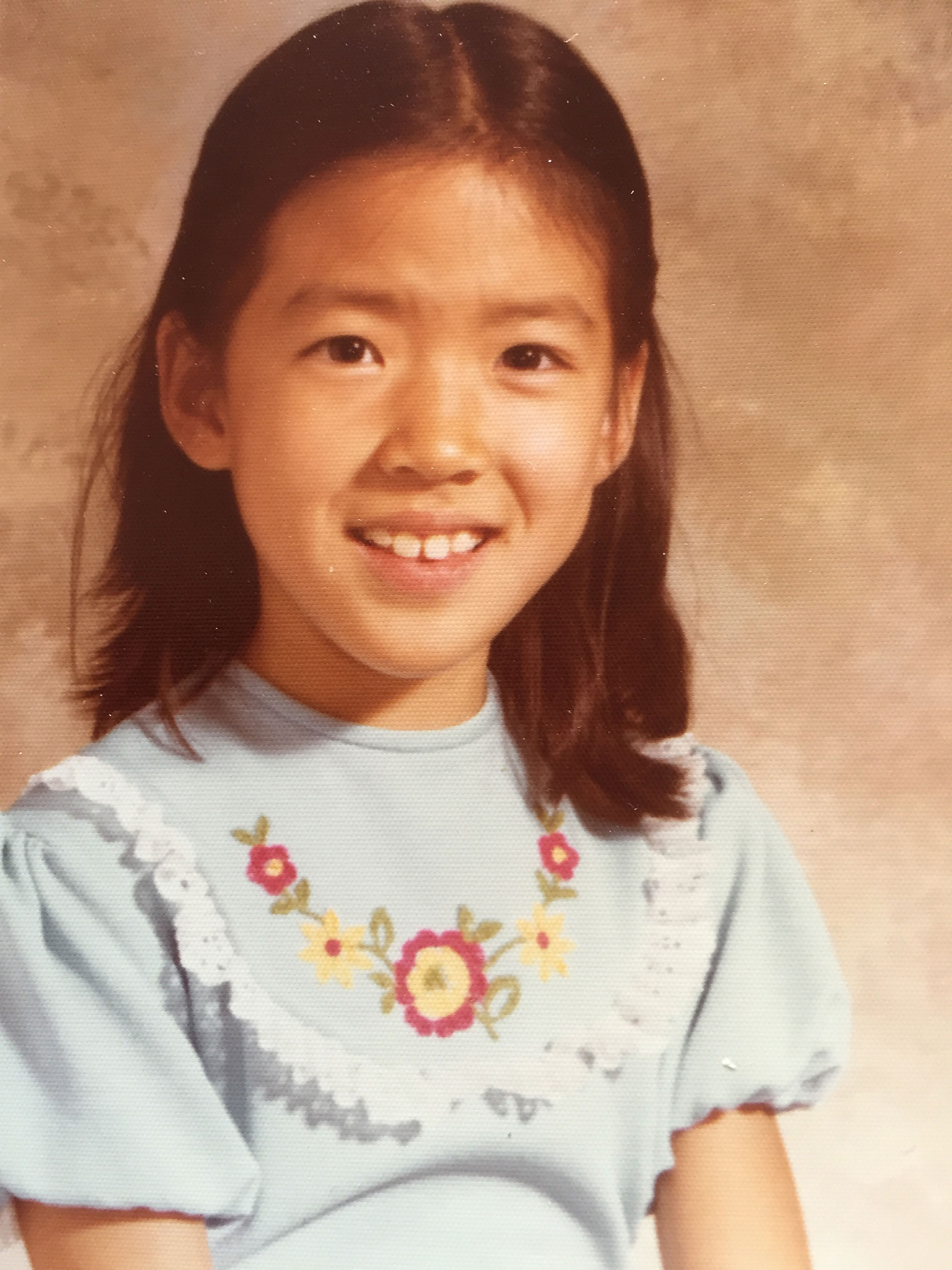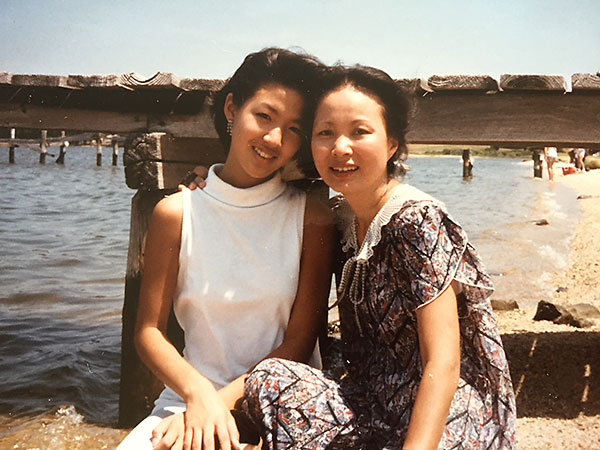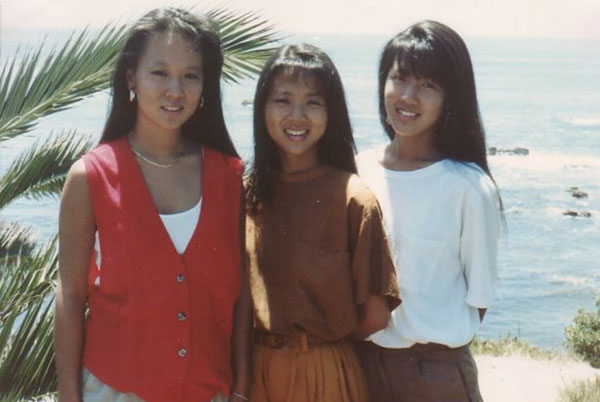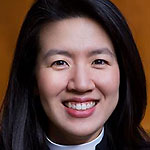
Christine travels even further back into her childhood to recount moments of longing and rebellion, and of finding her identity and worth in an unforgetting God.
"Memory is not simply about bringing the past into the present. Memory has an intrinsic relationship to hope in the future ... Through memory we can become aware of who we are before God and who we are before God creates the expectation that God will continue to sustain us in the future as in the past." — Sister Elizabeth Liebert, "The Way of Discernment: Spiritual Practices for Decision Making"
Not Forgotten
One of my earliest memories is from when I was about 3 years old. We were living in a small town in Indiana where my father was a seminary student. One day, he took my sisters and me to Dairy Queen to get some ice cream. My oldest sister, Grace, and I decided to go to the bathroom together. I was taking my sweet old time, and Grace, the watchful and nurturing older sister that she was, left me in there by myself before I was done. I wasn't concerned by this until I grabbed the bathroom door handle to leave. It didn't budge. I pulled again. Still nothing. I pulled and pulled and pulled with all the strength that my little arms could muster. It would not budge. That's when I lost it. I was convinced that I was going to have to live in that Dairy Queen bathroom by myself for the rest of my life and subsist on only ice cream — which in hindsight would not have been so bad. I screamed and cried and banged on the door with all my might.

The next thing I knew, the door opened and, through my tears, I saw my dad looking down at me. Behind him, everyone in Dairy Queen was staring in our direction. He picked me up and I threw my arms around his neck and buried my face in his shoulder, hiccuping from my crying, feeling all those eyes on me as he carried me out. I remember the look on my dad's face as he picked me up, how he looked down at me so lovingly, but also laughing and saying, "Christine, I wouldn't have left you in there." Actually, I don't even know if he really said that, but when I remember that moment, it's as if he said it because that was what I felt as he held me. It's a memory from my past that stays with me, that feeling of being rescued. That I had a father who heard me crying from behind that door and would not have left me alone to live in the bathroom of Dairy Queen for the rest of my days. It reminds me that I am not forgotten. I matter to someone.
Being an Outsider and an Insider
My parents immigrated to the U.S. from Korea in 1964. I was born in Indianapolis while my father was studying, and then moved to Maryland, right outside of Washington, D.C., when I was 5 years old. It was the late 70s, and there were a lot of Koreans immigrating to the U.S., struggling to make it. I attended Columbia Park Elementary School in Landover where there were a lot of African American and Korean kids. I remember being such a happy and carefree child. During recess, all the little Black girls would be out on the playground doing these cheers and I'd be right in there with them. I can still remember my favorite cheer: "L-O-V-E, love, L-O-V-E. Christine's my name and love is my game, I've got the boys on my mind, Taurus is my sign, and who blows your mind, my mommy blows my mind! Hit it! Mm-mm-mm-mm, alright! Mm ... hit it!" I had no sense of being different from those girls. There was such a purity and goodness in it.

Then in the third grade, we moved from our small apartment to a house in a nicer neighborhood, and I went from very diverse Columbia Park to being one of the few minorities in my class at Lamont Elementary School. And I started to get picked on. I was called racial slurs, teased, and bullied mercilessly. There was this group of girls I fell in with, and in that way kids could be so cruel, they wanted me around but only to have someone to pick on, to feel superior toward. I was such a sweet and agreeable child, so desperate to belong, so wanting to please. And instead of standing up for myself, I took it. From third to sixth grade, every single day, it was never-ending abuse. And that happy carefree Christine began to shrink inwardly and disappear. At that age, I didn't have the perspective to understand what was happening to me internally. For the first time in my childhood, I experienced rejection — what it's like to be on the outside, to have someone think you are not worthy of love and respect.
In those seminal years, I started believing that I was inferior to white people. It was a dissonant experience because in my church world, it was the complete opposite. In the Korean church, the pastor — my dad — is held in high honor. On top of this, my dad was becoming more and more well-known in Korean Christian circles. Church members lavished love and attention on me. Whenever adults would see me, their faces would light up and they would give me a big hug and say in Korean, "Oh, you're so sweet! So pretty!" Since my dad was the pastor, I was "special" and treated as such. Everyone looked like me. I wasn't an outsider there. I was very much on the inside, because I belonged. My status among my peers put me in the position of drawing others into the center. And so there was this split in my life where I learned that when I'm with white people, I am inferior, and when I'm with Koreans, I am valued.

As a child, I became afraid of Black people. I almost never interacted with African Americans after I left Columbia Park. At our church, many members owned stores in inner-city neighborhoods. More than once over the course of my childhood and teenage years, people were robbed; some were even killed. It did not happen often, but it happened, and it stoked my fear of Black people. And let's be real here, and this is a huge generalization, but Koreans can be very racist when it comes to African Americans. There is a reason why historically there has been tension between our two communities. So during that time of my life, these seeds were being planted in me — seeds of being an outsider, seeds of unworthiness, seeds of fear. It was only later in life, as an adult, that I began to see how God wove those experiences into who I am and what He has called me to today.
Desire
I can't remember exactly when this happened, but it must have been some time in the fourth or fifth grade. I was standing outside in the front yard of my home on Jodie Street and it had just rained. We had these beautiful flowering trees and azalea bushes surrounding our house. You could see the drops of water clinging to the flower petals, making everything look shimmery. The grass and leaves on the trees were so vivid and green. I breathed in that smell of fresh rain. The world to me at that moment was so beautiful, and suddenly, I felt something that I can only describe as an overwhelming sense of longing. A desire for something that seemed bigger than what I was experiencing in that moment. Many years later, I read C.S. Lewis' autobiography "Surprised by Joy: The Shape of My Early Life", where he describes a very similar experience he had as a child. He also was standing near a flowering bush at the time when he was reminded of his brother bringing his toy garden into the nursery. He goes on to say:
"It is difficult to find words strong enough for the sensation which came over me; Milton's ëenormous bliss' of Eden (giving the full, ancient meaning to enormous) comes somewhere near it. It was a sensation, of course, of desire; but of desire for what? Not, certainly, for a biscuit tin filled with moss, nor even (though that came into it) for my own past — and before I knew what I desired, the desire itself was gone, the whole glimpse withdrawn, the world turned commonplace again, or only stirred by a longing for the longing which had just ceased. It had taken only a moment of time; and in a certain sense everything else that had ever happened to me was insignificant in comparison."
I never forgot that feeling. It didn't come upon me often, but the times that it did, it had that same quality about it — an ache, a longing, a desire for something beyond me.
Trying to be Bad ... and Failing Miserably
As I grew from childhood into adolescence, my experience of God was somewhat typical for a Korean church kid. I went to Sunday School and youth group faithfully. I knew all the stories of the Bible and the "right" answers to questions about what Christians believe. I remember church retreats filled with goofy skits and youth group games, testimonies around the campfire, and the emotional culmination on the last night. Someone would be on the synthesizer playing a worship song in the background while our speaker or youth pastor would be preaching about something convicting and we'd all be bawling our eyes out. When I talk to people who had similar experiences in Korean church youth groups, there is often a sense of negativity about them. It's easy as an adult to look back on those experiences with cynicism. But I remember as a teenager, those moments were significant for me. I remember genuinely feeling God's love for me and that I wanted to love Him faithfully.
Those earnest experiences were mixed in with typical teenage rebellion as well. I had the added pressure of being a "PK" (pastor's kid), where on the positive side, people lavished love and attention on me. On the negative side, they were always watching me on how I dressed and behaved. Because I was the pastor's daughter, I was to be an example to others. I can remember too many times when adults commented on the length of my skirt, or whether a pastor's daughter should be wearing or acting like that. I didn't like those expectations being put on me, and so I attempted to rebel. I say "attempted", because I wasn't very good at it. Every time I tried to do something bad, I'd get caught. I skipped school, which everyone did, and I got caught. The security officer saw me and a friend leaving the school parking lot in a car, wrote down the license plate number and traced it back to my friend. We were suspended. My parents were furious.

During my sophomore year, my friend from youth group, one of the elders' daughters, and I got caught shoplifting. With our stolen clothes, we made it just past the store entrance back into the mall when we felt large hands on our arms. It was security. We made the amateur mistake of leaving the tags on the floor of the dressing room. We were penalized with washing fire trucks and attending a seminar on shoplifting.
My sisters seemed to get away with stuff all the time, but somehow I'd always get caught. After a few of those times, I just gave up trying to be bad. While it was frustrating to me at the time, I see God's grace in it now. When I think about some of my friends who never got caught and how that encouraged them to engage in more risky behaviors like alcohol, drugs, and premarital sex, and the consequences of those decisions, I am grateful for getting caught.
Desire Defined
Grace was home from college and she left a book that she had been reading on our coffee table. It was A.W. Tozer's "The Pursuit of God". As I said earlier, at the time, I was this mixture of being a faithful youth group kid, typical 80s teenybopper, would-be rebel who wasn't very good at being rebellious. I had my moments of genuine connection with God, but I can't say that I was totally serious about my relationship with Him. I am not sure what possessed me to pick up that book. Even when I read it now as an adult, it's heavy stuff. My "reading" interest at the time was Tiger Beat magazine because it had photos of the original "Karate Kid", Ralph Macchio — my teenage crush — and Ricky Schroeder from the TV show "Silver Spoons".
But I picked it up and could not put it down. Tozer wrote about how before we ever sought God, God was seeking us. He said, "We pursue God because, and only because, He has first put an urge within us that spurs us to the pursuit." And then he went on to talk about the intimate love relationship between the soul and God, and how, as in the words of St. Augustine, "Our hearts are restless, until they rest in Thee." As sinful human beings, we mistakenly try to fill that desire with other things, but we will never be satisfied until that desire is filled by God alone. Tozer goes on to say, "Come near the holy men and women of the past and you will soon feel the heat of their desire after God. They mourned for Him, they prayed and wrestled and sought for Him day and night, in season and out, and when they had found Him the finding was all the more sweeter for the long seeking."

Reading that book was like someone striking a match and setting fire to my heart. Suddenly, it all made sense. That longing I felt from my childhood days into my adolescent years was a longing for God. As a teenager, I had been looking for something to fill that hole in my heart: popularity, boys, trying to be "cool", desperately wanting to belong. And finally, it dawned on me. I belong to God. I've always belonged to God, but I never fully grasped what that meant. My heart found its true home and from that moment forward, my desire for God began to fuel me. I went to the bookstore at the Christian college my dad was teaching at and stocked up on books with titles like "Knowing God" and "Enjoying Intimacy with God". I went on a mission trip to Haiti with my church and had my world turned upside down. There, I encountered poverty and hopelessness like I'd never seen before: children with missing limbs in rags, people lying in filth on the streets, women walking for miles in dangerous conditions to get water for their families. But I also saw the power of God and the love of God like I had never seen before: missionaries and Haitian Christians pouring their lives out for the Gospel, and doctors and nurses serving far too many people than they could handle yet loving, serving, sacrificing, day in and day out. I felt like Moses on the mountain, seeing the glory of God passing before me, and it nourished me. I wanted to be a part of that, to help those on the outside know that they have a home. They belong to Someone. They have a Father, who loves and has not forgotten them behind some door they can't open, but hears their cries and will rescue them.
That's when I decided that I would become a missionary and headed off to Moody Bible Institute, which is where my previous story began. I look at those themes from my early life and see how those experiences have been woven by God into who I am and who He has called me to be in this world. I was this little girl on the other side of the door, pleading for someone to open it and find me. Now, God has called me to open that door for others and let them know that they are not forgotten. I was bullied and made to feel worthless because I was an outsider. Now, God has put me in a place where I am called to build bridges with people who are very different from me, to live out the truth that Christ has destroyed the dividing walls of hostility. I was filled with a longing for something I could not articulate for myself. Now, God continues to meet me in my desires for Him while also fueling a desire for more of Him. And He invites me into the longing that He has for us, our world, and all the things to be restored and brought to their fulfillment in Christ.
Tozer wrote, "To have found God and still to pursue Him is the soul's paradox of love ... St. Bernard stated this holy paradox in a musical quatrain that will be instantly understood by every worshiping soul: We taste Thee, O Thou Living Bread, and long to feast upon Thee still. We drink of Thee, the Fountainhead and thirst our souls from Thee to fill." Midway through my life at the age of 43, I now live this holy paradox. I found God. I pursue Him still. And my heart is filled with hope for the future, that one day I will no longer "see in a mirror, darkly; but then face to face" (1 Corinthians 13:12 ASV).
